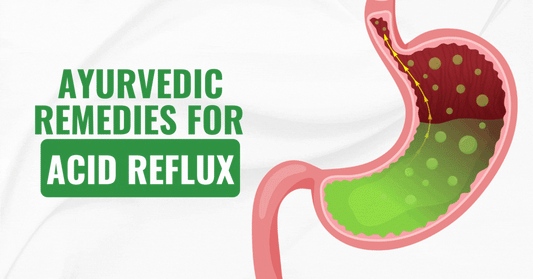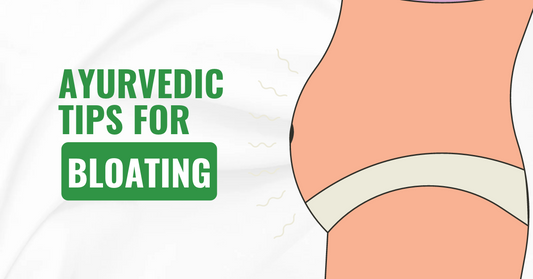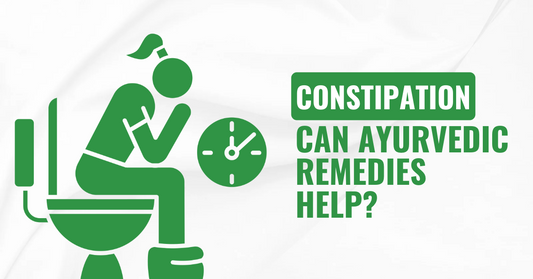Different Types of Urges According to Ayurveda
Share
Human bodies go through several processes naturally to maintain balance. These processes include the elimination and suppression of bodily and emotional urges. These urges consist of suppressible and non – suppressible urges. Let’s learn about them.

Suppressible Urges:
Suppression of these urges develops a person's character. The suppressible urges are the ones that mar a person's character due to its release. Giving in to these urges can cause a person to experience negativities in their lives. We often invite emotional problems by releasing suppressible urges.
Greed (Lobha)
The desire to have more even after having enough is known as greed. Uncontrolled greed towards any materialistic object can set off a chain of negative events in someone's life.
Grief (Shoka)
Letting grief take control over your mind and heart can immerse you into a life of immense sadness and darkness.
Fear (Bhaya)
Fear of the unknown or any uncertainties in life can prevent you from reaching your fullest potential as a human being.
Anger (Krodha)
Anger often stems from unfulfilled desires or wishes. Feeling anger towards things or events that are beyond your control can manifest into various bodily reactions.
Vanity (Mana)
Immense pride can often give birth to arrogance which might further cause you to disrespect or hurt others.
Shamelessness (Nirlajata)
Shamelessness is a lack of repentance or guilt after doing something unacceptable.
Envy (Irshya)
Envy is the feeling of unhappiness or disgust after looking at someone’s good achievements.
Attachment (Raga)
A strong emotional bond and attraction towards a person or a material and refusal of letting them go is attachment.
Non – Suppressible Urges:
According to Ayurveda, there are broadly thirteen types of natural urges that people should never suppress. These urges help release the substances from the body and help maintain the balance of the body and mind. One should never suppress these urges as they might lead to systematic disorders of the body. However, there are certain unfavorable situations where the person unwillingly suppresses these urges for a long time. These suppressions of natural urges create bodily disorders.
Urinating:
Often, workaholic people, tend to suppress the urge to urinate to save time for their work. Also, many children tend to develop a habit of suppressing this urge till their class gets over. Unfortunately, this suppression leads to bladder and phallus pain, dysuria, headache, unnatural bending of the body, and lower abdomen distention.
Eliminating Feces
Usually, people do not have the usual access to the bathroom in places outside the home. Therefore, if they feel the urge to release feces, they must wait until the bathroom becomes accessible. Also, some people tend to suppress this urge since they need to finish a portion of work for instant gratification. This habit of hanging around till the bathroom is available is sometimes short-lived or for a longer time. This frequent suppression of fecal elimination leads to problems like colic pain, headache, feces retention, abdomen distention, gas formation, and cramps in calf muscles.
Eliminating Semen
Unlike urine and feces, semen is not an excretory product. Instead, it is a reproductive element. According to Ayurveda, one should preserve semen, but one should release it in natural urge. Semen suppression leads to pain in the phallus and testicles, malaise, cardiac pain, and urine retention.
Passing out Flatus
Flatus passing or farting publicly often embarrasses people. For this fear of embarrassment, people suppress their flatus and hold it in. Unfortunately, this suppression causes feces, urine and flatus retention, abdomen distention, stomach pain, and abdominal diseases.
Vomiting
Vomiting is an unnatural process, and it happens in case of digestive problems or any other physical symptom. Vomit is quite difficult to suppress, but some manage to do so. It is a very unhealthy and dangerous habit. This forceful suppression leads to conditions like pruritus, urticaria, anorexia, black facial pigmentation, edema, anemia, fever, skin diseases, nausea, and erysipelas.
Sneezing
Certain nasal irritation, allergy, or a symptom of cold leads to sneezing. Often people have a habit of suppressing sneeze to avoid unnecessary attention publicly. Also, people tend to sneeze by keeping their mouths closed. It tends to develop internal injuries and ruptures. One gets problems like torticollis, headache, facial paralysis, and sense organs' weakness in suppressing sneezes.
Eructation
People suppress this urge to avoid public criticism. Eructation suppression leads to hiccup, dyspnea, lack of hunger, tremor, obstacles in normal heart and lung functioning.
Yawning
Again, the act of yawning leads to public criticism or humiliation. As a result, people consciously suppress this urge to avoid attention. This tendency of suppression leads to convulsion, facial muscle contraction, numbness, and shakiness in the body.
Eating (Hunger)
This urge induces food intake that fulfills the nutritional requirement of the body. Suppression of this urge leads to emaciation, weakness, bodily complexion change, malaise, and giddiness.
Drink Water (Thirst)
Another most essential non – suppressible urge is thirst. People suppress this urge for the same reason as the above – excess workload. This suppression leads to throat and mouth dryness, deafness, exhaustion, weakness, and cardiac pain.
Crying
Though the generation of tears happens due to emotional reasons, it instigates a certain physical release of urges. People usually suppress tears due to multiple forms of misjudgments from people. This suppression causes eye diseases, headaches, vertigo, and giddiness. Moreover, by holding back tears, one invites problems like depression, irritation, and mental stress.
Sleeping
Sleepiness is such an urge that indicates a person to get some rest. Proper sleep helps the organs of the body after working tirelessly. On the other hand, sleep suppression leads to yawning, malaise, drowsiness, constipation, body pain, headache, and heaviness of the eyes.
Fast Breathing
Fast breathing happens when there has been excess physical exertion. Physical exertion with improper breathing leads to shortness of breath, and people naturally tend to breathe fast. However, people tend to suppress this rapid breathing and invite problems like heart diseases, respiratory disorders, and fainting with certain wrong notions.
End Notes
According to Ayurveda, suppression of suppressible urges and release of nonsuppressible urges help create a complete balance between a person's physical, mental, and spiritual self.



